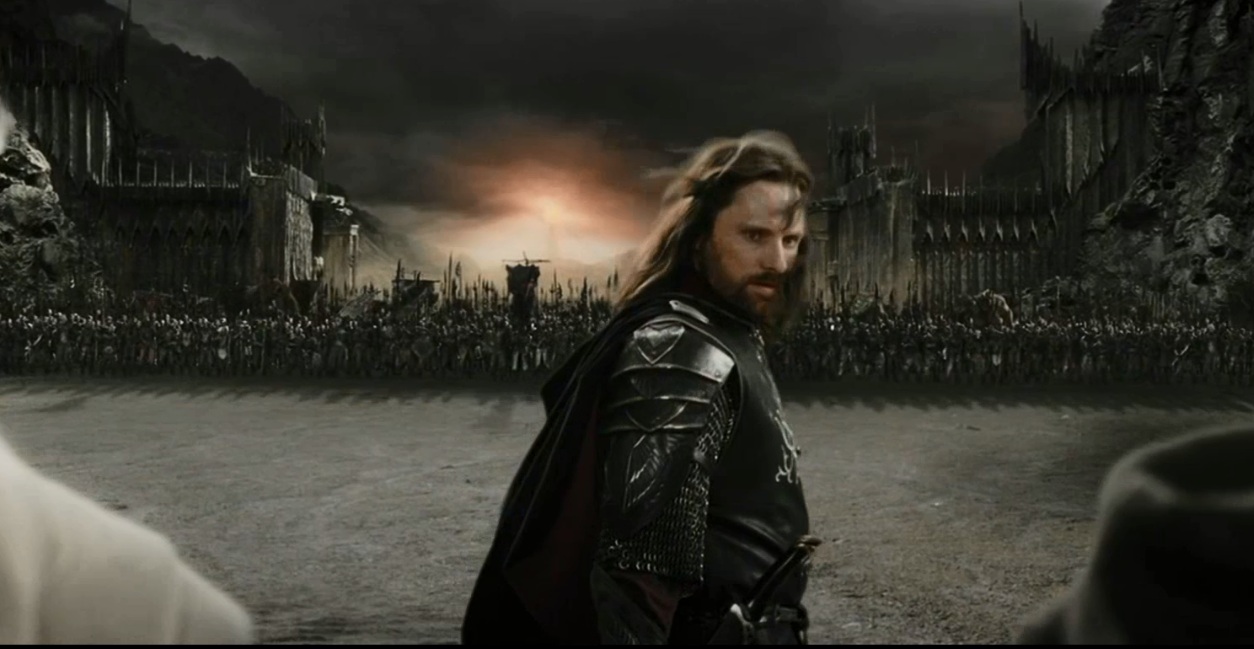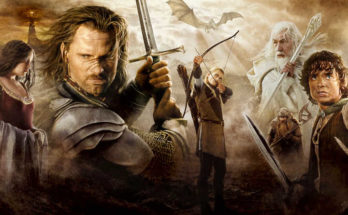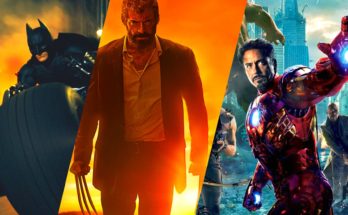First, I have to say that when a novel is made into a movie, it’s normally necessary to make changes in the story. This is especially true of an extremely long and complex work such as RETURN OF THE KING. And of course, RETURN OF THE KING is the third volume in a trilogy, complicating it even more. Peter Jackson not only could not assume the audience knew the basic story, he could assume the audience for RETURN OF THE KING had seen the previous two parts of the film trilogy.
However, eliminating subplots and changing details to enhance audience understanding is one thing — changing the artistic message of the entire work is another.
Yes, RETURN OF THE KING is powerful in many ways. The scenery, the characters, the special effects, the costumes, the battle scenes — for most of its running time it was a delight to watch.
Which made me all the more disappointed by the two drastic and quite damaging alterations he inflicted on the story.
First was cutting out the Scouring of the Shire.
Yes, their memories of growing in the Shire are what sustain Sam and Frodo through their trek through Mordor.
That’s all the more reason for including the Scouring. Tolkien was not a “literary” writer like Thomas Wolfe, but he understood that “you can’t go home again.”
By pretending that the Shire passed unscathed and unnoticing through a tremendous war between good and evil, an upheaval that forced everyone else in Middle Earth to choose sides, Peter Jackson trivialized the very events he’d just spent seven hours dramatizing.
Tolkien was not so naive. THE HOBBIT was a children’s book, but not LORD OF THE RINGS. He realized that the “old” Shire that the four hobbits knew had to be changed by the battles just as surely as Frodo was permanently scarred despite his heroism and why all the ring bearers had to eventually leave Middle Earth.
That the four hobbits could return and be sniffed at by an old lady thinking they’d been on a long, silly adolescent field trip… I wanted to throw up.
I realize the movie was getting long, but when they leave Middle Earth at the very end Jackson had plenty of time to focus on schmaltzy tears. Frodo, Sam, Pippin and Merry could have killed a few human thugs and run off the rest in less time than we were shown everybody crying.
But that’s not as bad as what Jackson did to the most important and powerful scene of the entire trilogy. The scene the entire story turns around — the destruction of the Ring.
In the book Frodo does finally put the Ring on. And right as he does so, Gollum comes out of hiding, bites off the finger with the Ring and jumps onto a ledge, jumping and dancing because he’s so delighted he finally has the Ring back.
He’s so deliriously happy, moreover, that before Frodo and Sam can react, he stumbles and falls into the volcano.
Jackson was apparently so blind to the power of this version that he felt it necessary for Frodo and Sam to push Gollum off.
And thus he changed the entire moral compass of the trilogy. Tolkien did not write his version because he was just so stupid he didn’t know that his main characters shouldn’t be passive actors. He was making a subtle point.
Remember that Gollum was the Ring’s creature. When the Ring needed Gollum, it warped him into a severe Ring-addict. That’s why Gollum follows Frodo into Mordor. He was in danger too, but too obsessed with the Ring to care.
That Gollum’s very “addiction” to the Ring caused its destruction is the very point of THE LORD OF THE RINGS — evil brings its own downfall.
And kindness and mercy are their own rewards. For many times in the book, Sam would have killed Gollum if Frodo hadn’t stopped him. Yet without Gollum, the Ring would have won. It lost because of its own evil and because Frodo had a good heart that did not want to see any creature killed unnecessarily.
Changing this transformed THE LORD OF THE RINGS from a powerful moral story into a mere fantasy adventure story.
Plus, I can’t imagine why Jackson had us watch that scene from a long distance below the action, disassociating us emotionally from it. In the book it’s close up and immediate. We’re right there with Sam, Frodo and Gollum. As we should be — it’s the true heart of the entire trilogy. It’s the point of all the other action.
I’ve forgotten many other details from LORD OF THE RINGS, but I’ll never forget that scene.



